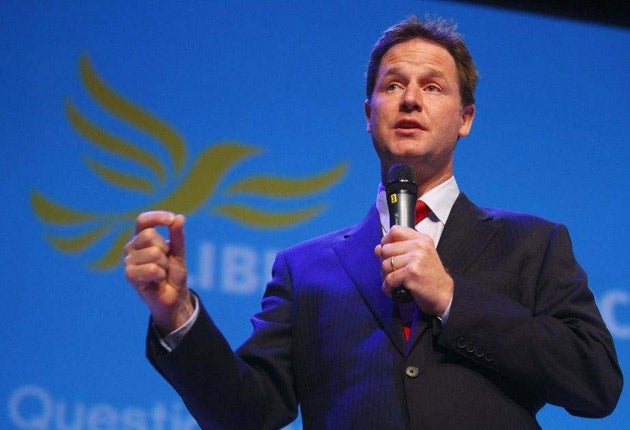Clegg challenged over tuition fees 'U-turn'

Nick Clegg was today seeking to quell anger in the Liberal Democrat ranks after moving to ditch the party's flagship manifesto promise to abolish tuition fees.
The Lib Dem leader was confronted by angry activists after admitting that his plans for "savage" cuts in public spending could render the policy unaffordable.
Charles Kennedy, the former Lib Dem leader, poured fuel on the flames by warning that the move could cost the party votes at the next general election.
Mr Clegg told activists that he was still personally committed to scrapping tuition fees but said they had to be "realistic" about whether the £2.5 billion-a-year bill was affordable.
During a question-and-answer session with delegates at the Lib Dems' annual conference in Bournemouth, Mr Clegg was urged by one to appreciate that scrapping fees was about "a lot more than just money".
Another warned that the party's support in university towns was likely to suffer.
Mr Clegg sought to play down the policy shift, insisting that it was only a matter of when - rather than whether - they would scrap tuition fees.
Mr Clegg said: "There is no question mark about my personal commitment to that policy.
"The only question mark is about when we can afford to scrap tuition fees."
He added: "None of us know precisely yet what we can afford. The issue is simply on the affordability."
But his chief of staff, MP Danny Alexander, earlier told reporters that, while the policy was "on the table" for the next manifesto, there was no guarantee that it would actually feature.
Delegates nevertheless backed a motion today reaffirming their commitment to abolishing fees for all part-time and full-time higher education courses.
Mr Kennedy warned that moves to dilute Lib Dem commitments on tuition fees and care for the elderly could undo gains he had himself made as leader in the 2005 election.
He told BBC1's Andrew Marr Show that they had "served us well", adding: "In terms of parliamentary reality these age groups were very important to us at the last election - some of the gains that we made, not least against Labour."
Mr Kennedy made another unhelpful intervention later by appearing to discount the possibility of the Lib Dems entering a government coalition with the Tories.
The former leader, who has taken a high-profile role at the conference, said the two party's stances on the European Union were too far apart for them to form an alliance in the event of a hung Parliament.
While Mr Clegg has also attacked the Tories this weekend, he has steadfastly refused to talk about coalition possibilities and does not want to rule out any potential scenarios.
But at a fringe event hosted by the Foreign Policy Centre, Mr Kennedy said the Tories' anti-EU position was one of "several straws that would break any camel's back".
"I just don't see how we could make common ground with a Cameron-Hague administration on the European issue," he said.
"I mean pigs would fly."
Mr Clegg earlier indicated he would not work with the Tories after Mr Cameron called for their two parties to work together - but maintained his usual silence on the chances of a coalition.
Mr Cameron urged the Lib Dems to join forces with the Conservatives in a new "national movement" to defeat Labour, only for Mr Clegg to state that the two parties were "totally different".
"We stand for the progressive hopes that have been betrayed in the last 10 years and I believe we can replace Labour over time," he said.
Mr Clegg has stepped up his criticism of the Tories this weekend, describing their leader as "the con man of British politics".
But the Conservatives have sought to stress their similarities with the Lib Dems, who could become kingmakers if none of the parties hold an outright majority after the next election.
In an article for The Observer, Mr Cameron suggested the Lib Dems were creating dividing lines that did not exist between the two parties.
In areas like civil liberties, education and climate change, Mr Cameron said, there was "barely a cigarette paper" between the two parties.
Under pressure to detail where his planned cuts will land, Mr Clegg also today signalled plans to target the wealthy with even higher taxes than already pencilled in.
Asked whether the rich would have to pay more compared even to plans laid out so far, he said: "Yes, unambiguously yes.
"What we believe is now necessary is a big tax switch where you close the huge loopholes that very wealthy individuals and large corporations can presently exploit, in effect escaping the reach of the taxman."
That would include bringing capital gains tax into line with income tax rates and ending tax relief on pension contributions for higher earners.
The Lib Dems also plan to raise the starting threshold for paying income tax to £10,000 to assist lower earners.
But he said that efforts to reduce Britain's debt mountain would begin with cuts in public spending rather than tax rises.
"The first port of call of filling this great gap in our public finances has to be through reductions, cuts, savings in public spending, not immediately reaching for the taxman and saying taxes should go up on ordinary incomes," he said.
Other money-saving measures suggested by Mr Clegg included ending tax credits for high earners and freezing pensions for highly-paid public sector employees.
And he outlined plans today to axe at least 90 quangos, reduce the number of Government departments from 24 to 14 and cut the number of MPs from 646 to 500.
Subscribe to Independent Premium to bookmark this article
Want to bookmark your favourite articles and stories to read or reference later? Start your Independent Premium subscription today.

Join our commenting forum
Join thought-provoking conversations, follow other Independent readers and see their replies